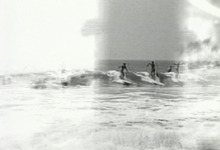Key West is located near the southern tip of Florida, not far from Key Largo. In contrast to
Key Largo (John Huston, USA 1948), Key West has no need of gangsters to reveal this paradise on earth to be an illusion.
Looking back from a distance of nearly 50 years, it is sufficient
to reconnect those images which - each in itself - represented a longing view of this paradise: images of boat-like cars sailing down the highway, of bikini-clad girls on the beach, of surfers riding the waves. A moral lesson? Possibly.
But a different question poses itself first: Why is it that these images still arouse such a great deal of fascination when the majority have succumbed to sound reasoning long ago? Why does such an image of longing, reduced in potency but still effective, appear among strategies of alienation - the overlapping and shuffling of various images, their partial obstruction by palm trees passing in the foreground, the intrusion of mechanical sounds into the harmonies of the genre music? Precisely what do images of driving, the beach and surfing under Florida's sun have to do with a promise of freedom? According to Walter Benjamin, it is the fact that this promise has never been fulfilled. These images return as fragments in a dream which - assuming it has not yet become reality - quite closely resembles a trauma. In this sense, Key West makes clear the price which must be paid for dreams founded upon images.
(Vrääth Öhner)
Translation: Steve Wilder
1 PRINT IN DISTRIBUTION
|
distribution format |
Digital file on server (PAL) |
|
screen |
4/3 (single screen) |
|
speed |
25 fps |
|
sound |
sound |
|
rental fee |
23,00 € |






